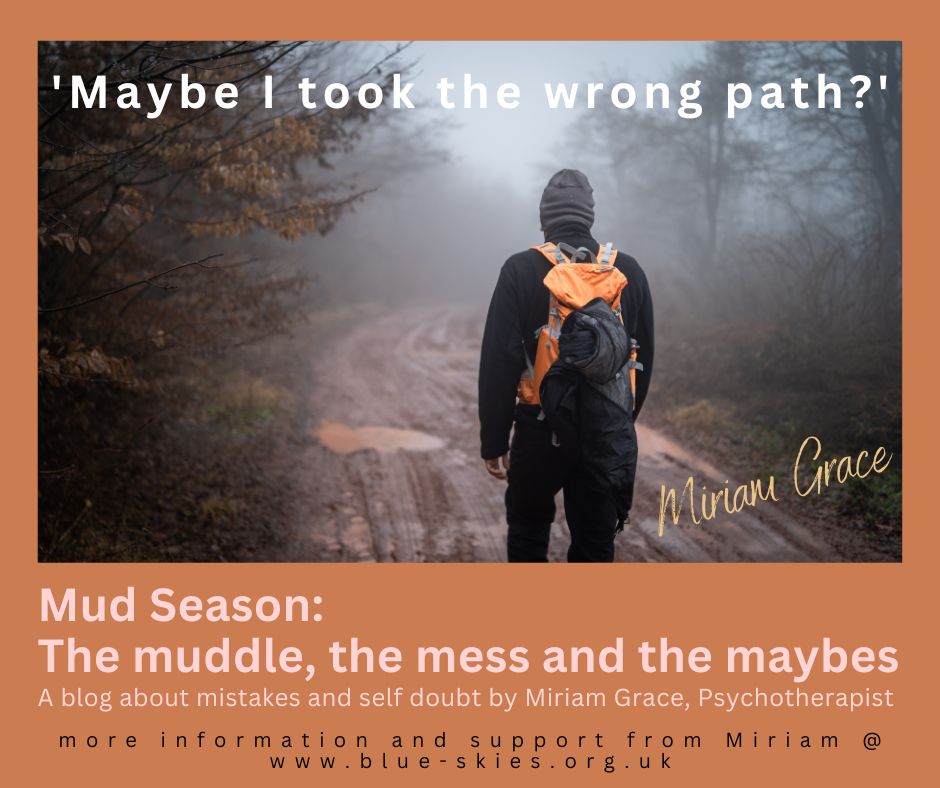
Sometimes we believe that if we can make better decisions we will improve things and we forget that part of life is the muddle, the mess and the maybes.
“We call this the mud season.” my friend Nancy said, when we were discussing the energy of spring. In spring we plant seeds in hope of new growth, we cut back dead wood, we clear away that which we no longer want, we ‘spring clean’. Then we worry: did we take action too soon? Should we bring the pots inside? We blame ourselves if things go wrong: I should have known a frost would come! We step outside, the garden is mud, it looks a mess and what keeps us going? How do we keep believing when the spring is unpredictable? It is mild and sunny, then there’s a frost or a storm. Spring teaches us that we can cope with not being in control. We also draw on our repeated memories of the garden working out each year. We lose some plants, and fall in love with unexpected new plants, we don’t know for sure what will will flourish. We remember that we cope with mud and messiness, we ride it out. We remember it’s a good idea to wear a scarf for those sudden cold winds, and then we step outside into the mess.
It’s not uncommon to compulsively wonder ‘what if?’. It may often be part of the grieving process
If we live in an engaged fashion, if we are willing to have changing seasons in our life, we are, sooner or later, going to experience grief or regret and anxiety. As children, who have perhaps experienced trauma or a parent’s anxious over protection of us from difficult feelings, we may have begun to believe that we can’t handle grief, guilt, regret, anxiety. What was true for us at age 4 isn’t true for us at age 40. We may need to remember our systems have ‘updated’ and been ‘upgraded’ and that we can face change and uncertainty and, yes, self reflection.
We can avoid these more challenging feelings by staying stuck and fearing making decisions at all OR we can learn that we can can tolerate these feelings, learn from them and then let them go and move on.
In my work as a therapist a frequent rumination / paralysis is whether to take relationships to the next stage, and an even more frequent regret is the end of a relationship. I run specialist heartbreak groups because this is a time when support and intervention can really help.
Women in particular take a huge amount of responsibility for relationships working out. Conditioning that leads women to believe they are the caretakers of relationships also leaves them with immense capabilities to ruminate and to go over and over their analysis of the situation, the decisions they made and ultimately to feel responsibility and guilty for the ‘failure’ of that relationship. Has anyone else participated in the relationship? And are they also ruminating, questioning, working hard and feeling bad about what has come to pass? Seldom.
In some ways blaming herself and feeling stuck in that process is a deflection from a fact of life, that we are not in control of changes, we can’t always fix things, and to face the anxiety of a truth that longevity of relationships is difficult to predict.
If you are stuck in the muddiness of maybes and guilt, then read on.
If you are stuck in procrastination in order to avoid the maybes and the guilt then read on.
Fully living involves letting ourselves know we can bear it, that we can tolerate stepping out in the mud season. Guilt is a pricking of conscience that we CAN bear. Our actions or judgment ARE questionable and we can cope with that. With a healthy process we can use guilt to take responsibility to evaluate our actions in the light of hindsight, to correct our course, repair damage and then let it go. See how to do this in more detail in my blog GUILTY!
If the guilt feels unbearable then it is more likely that it is shame. With shame we feel that WE are wrong, we are failures, we are defective. (Guilt is about our behaviour being questionable.) This is a good time to consider therapy or group support.
Chronic shame often comes from having had too much criticism and judgment growing up. Often from perfectionist parents who wanted us to be perfect. These shame bound families are not known for impulsive behaviour, for making a mess or mud pies! They are constantly aware of what the neighbours will think. They don’t want to be caught out as being wrong, or silly, untidy or unusual. Shame leaves us feeling unloveable and stuck in over thinking. We don’t want to feel this unbearable feeling and this is often what leads to avoidance of living for fear of making wrong decisions and getting stuck in shame.
We try our best, learn from our mistakes, and still believe we are valuable and loveable
Spring however does urge us to spring, with good faith. There’s a rush of energy, hope and courage. Some of the women I know give up one job and career for a completely new job, or no job, full of self doubt and anxiety they keep their doubts to themselves, while it reduces the chance others might witness their ‘failure’ at a new venture, it also reduces their support base. If we can admit our doubts, we can be stronger in our connections and community. Others stay in soul destroying situations because they don’t want to wade out into the mud.
We can turn this around by living our lives, feeling some worry that we may have made mistakes, evaluating this and acknowledging that if we had the chance to re-do that situation we might have done things differently. Then we are modelling the opposite behaviour of the shame inducing perfection that raised us.
The modelling to others, maybe our own children, is that we try our best, learn from our mistakes, and still believe we are valuable and loveable when we are not perfect.

The Eschatological Laundry List*:
In the book “If you meet the Buddha on the road, kill him” there is a list of ‘truths’, two of which are pertinent here:
– All important decisions must be made on the basis of insufficient data
-Yet we are responsible for everything we do
Responsibility for our actions is one of the four existential questions Irvin Yalom describes as being at the root of all psychological distress/therapy, (the others are the apparent meaninglessness of life, being alone, death).
The thing is, we can never know what would’ve happened if we took the other path (insufficient data).
Essential to moving on is knowing that we do the best we can with what we know at the time.
Some clients speak of feeling as if they have completely messed their lives up and that of their children. Decisions that were supposed to be life affirming choices are now doubted. I always remember that the context is that this woman has been feeling responsible for the happiness of many others, including herself, and that seeing the way forward, clearly can be difficult. Considering her own happiness might now be seen as a moment of impulsive spring madness, rather than the pressure of an unmet need that has grown and grown and grown over decades.
We can only be where we are now, we can only work with what we have, we can only move forward. This doesn’t need to be cold and heartless, we can acknowledge the impact on others, we can be kind, we can work to either repair injuries or to improve our approach next time.
Sometimes children are old enough for us to say to them, “I have decided we are going to be doing this. To me, it seems like the right decision and if I’ve missed something, then I apologise for that.“ Children of all ages, are not able and should not be requested to reassure us about things we can’t reassure ourselves of.
Perfectionist parents who expect high standards of themselves often create children who are anxious about making mistakes. It is a gift to children and adults alike to be loved as they are. For others to really internalise this stance they have to see us not bullying ourselves about mistakes we make. If they see us regretful and sad and able to act on that in a balanced way, that’s surely an example of good mental health?
Look around you at adults who have more confidence. They don’t overanalyse, they don’t try hard, they move forward and adjust as the results of the data coming come in.
It can be really helpful for children to see that their parents were not perfect. For one thing, it takes the pressure off them to be perfect.
Increasing our tolerance for not being perfect, for making a bit of a hash of things and knowing we are still precious and loveable isn’t only helpful to us, but to others and our children if we have them. We often think that being a perfect mother and protecting the little ones from distress and upheaval is the ideal. But I think forgiving ourselves, making repairs, making peace and apologising actively are far more valuable and achievable life skills for others to be observing than berating ourselves every time we get it wrong.
Best foot forward, step into spring, experiment with tolerating the mess of the mud season.

* The Eschatological Laundry List can be found HERE